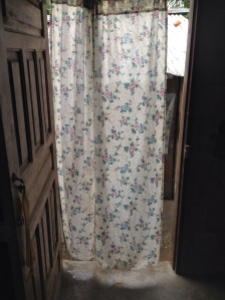Grains of Sand
“This is a picture of Sulma’s sixth grade graduation.”
There’s group of girls in light blue dresses sitting against the wall.
“Look at this one. That’s Sulma’s teacher there. She’s giving her a medal.”
A dark haired girl stands in front of a microphone as a taller, older woman lifts a ribbon around her neck. There’s a slight band around Sulma’s forehead that shows she’s wearing a wig.
Guillermina shoves a few more photos in front of me. Each one is a different snapshot from her daughter’s sixth-grade graduation. She talks about the event like it was the best day of her life and based on what she’s already told me, I believe it was.
“And here is one of Sulma dancing with our friend from the US.”
Sulma is standing with a tall, white American who has a dark mustache and mid thirties hair. He looks like my uncle Ian.
“He paid for a few of her chemo treatments as well, so we invited him to come to the graduation. He bought food for the party. Here’s another picture of Sulma and her doctor, who was such a good friend to her.”
I asked more about the cancer. She shuffled through the photo album and took out a yellow sticky note. On the note was a long medical name, but the first word was clear: “Leukemia”
A few years ago, Guillermina was uncertain that her daughter would be participating in her graduation. The constant visits to chemotherapy had left them strapped for cash. Yet, this rite of passage was very important, especially since Sulma had put in extra effort during the year.
“I’d pick her up from chemo one day and she’d be off to school the next.”
The cost for the event was going to be $25 per person until her friend told her it would be more.
“It cost me $75 for the graduation and I didn’t know what to do. I already put everything I had into the chemotherapy treatments. I sold my necklace, my bracelets, my clothes- lord, what didn’t I sell? Then, the same friend that told me it would cost more did something great; she offered to pay a portion of the cost. It made me so happy. She said she wanted to do her part, and she said- do you know what she said? She told me: God touches hearts and opens doors.”
 She nodded.
She nodded.
“So you know what I do? Ever since then, I try every day to touch hearts and open doors.”
From 2010 to 2013 Guillermina took her daughter Sulma to the hospital for treatment. She splays out a list of costs per week and all the signatures from the doctors who saw her. She was making regular payments of $25 and above on a weekly to monthly basis. She made the quotas using a patchwork of her own efforts and the help she got from others. In 2012, when she met us, we became one of those patches as well.
“God says that to give even a grain of sand, is good.”
With that, Guillermina hit the nail on the head. We can’t tell you a story about La Ceiba saving someone through microfinance because that’s not how reality works. To really address problems like these we have to realize that our job is to flick sand at the bonfire. We can’t extinguish it ourselves, but we can contribute.
Everyone in those photos was part of the same movement to alleviate hardship and poverty. The donor, the teacher, and the doctor all chipped in. Like them, we realize that our role in Honduran society is to be careful givers. That’s something we can do. It took the passionate love of a mother and daughter to really patch things together and make a difference. That’s something we can’t do and Guillermina knows it better than most.
For this reason, I accept that my job is to flick sand. I’m not intensively entering Guillermina’s house all the time to break down her financials. I come to chat. In fact, the last time I was in her home I spent the majority of the time watching the rain outside. I was leaning against the doorframe sipping on a cup of coffee while her and Digna ignored me to talk about hemming a dress.
Our job is to be present and establish trust, so when she does come to us, she can count on us to give our grains of sand. Hence, when Sulma started improving in 2014, Guillermina continued to use La Ceiba loans to make the check up appointments.
Now Sulma is moving through college. Gullermina explains that they have to buy a $13 skirt and a $12 shirt for her next year.
“So I wanted to ask you for a personal loan,” she told me, “Not from La Ceiba, but from you, because I know you have a kind heart.”
I had to decline. I offered to buy her flat cakes instead and give them to my friends on the way home. I told her this would be my grain of sand. There was a brief moment where her eyes narrowed in a critical gaze that we have come to know and love, but then she smiled and touched my arm.
“If you can’t then that’s fine. Do you know what you can do instead? You can tell Sulma’s story. Tell La Ceiba. Tell your friends, tell everyone you know. It’s not to ask for money, but as testimonial; to encourage God’s blessings. Sulma’s story does just what I told you; it touches hearts and opens doors. And maybe, just maybe, the grains of sand will keep coming.”
Jeff Paddock
Program Director – Honduras

 Previous Post
Previous Post Next Post
Next Post